Autism In Europe: All The Facts
Unveiling all the facts about autism in Europe. From diagnosis to rights and cultural perspectives, explore the landscape of autism in Europe.

Understanding Autism in Europe
Autism is a neurodevelopmental disorder that affects individuals across the globe, including Europe. To gain a comprehensive understanding of autism in Europe, it is crucial to explore its definition, as well as its prevalence in the region.
Definition and Overview of Autism
Autism, also known as Autism Spectrum Disorder (ASD), is a complex condition that impacts an individual's social skills, communication abilities, and behavior. People with autism may display a wide range of characteristics, including difficulties with social interactions, repetitive behaviors, and sensory sensitivities.
Autism is typically diagnosed in early childhood, although some individuals may not receive a diagnosis until later in life. It is important to note that autism manifests differently in each person, resulting in a diverse spectrum of abilities and challenges.
Prevalence of Autism in Europe
The prevalence of autism in Europe varies across different countries. The data below provides an overview of the estimated prevalence rates in select European countries:
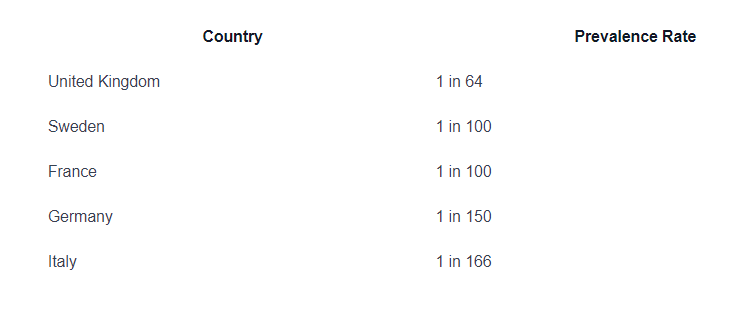
It is important to remember that these prevalence rates are estimates and may vary based on the criteria used for diagnosis and data collection methods. Additionally, autism prevalence can be influenced by factors such as awareness, access to diagnostic services, and cultural attitudes towards autism.
Understanding the prevalence of autism in Europe helps shed light on the scope of the condition and highlights the need for support, services, and resources to meet the diverse needs of individuals on the autism spectrum.
By gaining insights into the definition and prevalence of autism in Europe, we can foster greater understanding and promote inclusive approaches to support individuals with autism and their families throughout the region.
Diagnosis and Treatment
When it comes to autism, early diagnosis and appropriate treatment are crucial in helping individuals lead fulfilling lives. In Europe, there are established processes for diagnosing autism and a range of approaches for treatment and support.
Diagnosing Autism in Europe
Diagnosing autism in Europe follows standardized criteria set forth by international classification systems such as the Diagnostic and Statistical Manual of Mental Disorders (DSM-5) and the International Classification of Diseases (ICD-11). These diagnostic criteria focus on assessing social communication skills, repetitive behaviors, and sensory sensitivities.
The process of diagnosing autism typically involves a multidisciplinary approach, with professionals from various fields collaborating to gather information and make an accurate assessment. This may include psychologists, pediatricians, psychiatrists, speech therapists, and occupational therapists.
To aid in the diagnosis, specific assessment tools and scales are utilized to evaluate a person's behavior and development. These assessments consider the individual's history, observations from caregivers, and direct interactions with the person being evaluated.
It is important to note that the availability and accessibility of diagnostic services may vary across different European countries. Efforts are being made to improve access to timely and accurate diagnosis, ensuring that individuals with autism receive appropriate support and interventions.
Approaches to Treatment and Support
Autism treatment and support in Europe encompass a wide range of approaches tailored to the unique needs of each individual. These approaches aim to enhance communication skills, social interactions, and daily living skills, while also addressing any associated challenges or co-occurring conditions.
The treatment options for autism vary and may include:
- Behavioral interventions: These interventions focus on teaching and reinforcing desired behaviors while reducing challenging behaviors. Applied Behavior Analysis (ABA), Early Intensive Behavioral Intervention (EIBI), and Positive Behavior Support (PBS) are some examples of behavioral interventions widely used in Europe.
- Speech and language therapy: This therapy aims to improve communication skills, including speech, language comprehension, and social communication. Speech and language therapists work closely with individuals with autism to develop and enhance their communication abilities.
- Occupational therapy: Occupational therapists help individuals with autism develop skills for daily living, such as self-care, fine motor skills, and sensory integration. They provide strategies to manage sensory sensitivities and enhance participation in various activities.
- Educational support: Specialized educational programs, such as inclusive classrooms, special education schools, or individualized education plans (IEPs), are available to support the learning and development of individuals with autism. These programs emphasize individualized instruction, tailored to the specific needs and strengths of the individual.
- Medication: In some cases, medication may be prescribed to manage specific symptoms or co-occurring conditions associated with autism. The decision to use medication is made in consultation with healthcare professionals and takes into account the individual's overall health and needs.
It is important to note that treatment approaches may vary based on individual needs, preferences, and available resources within each European country. The goal is to provide comprehensive and person-centered support, enabling individuals with autism to reach their full potential and enhance their quality of life.
Legal Framework and Rights
When it comes to autism in Europe, there is a legal framework in place to protect the rights and ensure the well-being of individuals on the autism spectrum. This section will explore the legislation and policies related to autism in Europe, as well as the rights and support available for individuals with autism.
Legislation and Policies in Europe
Across Europe, various legislation and policies have been implemented to address the needs of individuals with autism. These laws aim to promote inclusivity, equal opportunities, and access to essential services. While specific laws vary by country, there are common themes and principles that guide the legal framework for autism in Europe.
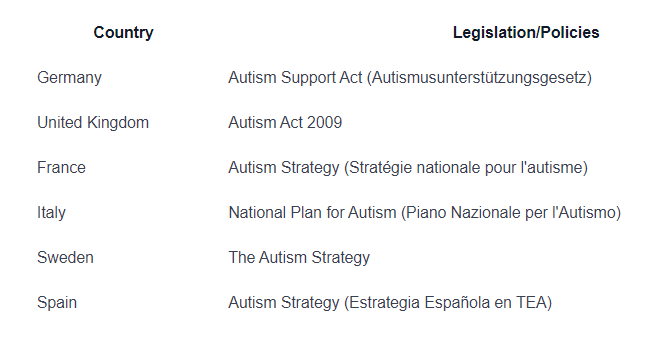
These legislations and policies focus on areas such as early diagnosis, intervention, education, employment, and social inclusion. They aim to raise awareness, improve services, and ensure that individuals with autism have equal rights and opportunities.
Rights and Support for Individuals with Autism
In Europe, individuals with autism have certain rights and entitlements to support their well-being and inclusion in society. These rights encompass various aspects of life, including education, healthcare, employment, and independent living.
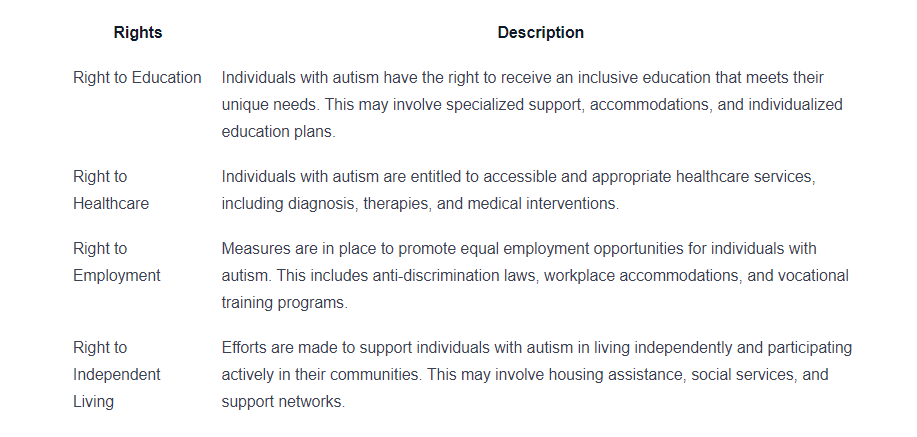
It's important to note that the specific rights and support available may vary across European countries. However, the overarching goal is to ensure that individuals with autism are granted the same rights and opportunities as their neurotypical counterparts.
The legal framework and rights for individuals with autism in Europe highlight the commitment of European countries to promote inclusivity, support, and equal opportunities for individuals on the autism spectrum. By recognizing and upholding these rights, society can work towards creating a more inclusive and understanding environment for individuals with autism.
Education and Employment
Individuals with autism in Europe face unique challenges and opportunities when it comes to education and employment. In this section, we will explore the educational opportunities available for individuals with autism and the challenges they may encounter in the employment sector.
Educational Opportunities for Individuals with Autism
In Europe, there has been a growing recognition of the importance of inclusive education for individuals with autism. Efforts have been made to provide educational opportunities that cater to the diverse needs of individuals on the autism spectrum.
Special education schools and programs have been established to support individuals with autism in their academic journey. These schools often have trained professionals and specialized curricula that focus on developing social and communication skills, as well as addressing the specific learning needs of individuals with autism.
In addition to special education schools, mainstream schools in Europe are increasingly implementing inclusive practices to ensure that individuals with autism have access to quality education. This may involve providing additional support services, such as speech therapy, occupational therapy, and individualized education plans, to meet the unique needs of students with autism.
It is important to note that the availability and quality of educational opportunities for individuals with autism may vary across different European countries. However, efforts are being made to promote inclusive education and improve access to appropriate educational resources for individuals with autism throughout Europe.
Employment Challenges and Initiatives
While progress has been made in providing educational opportunities, individuals with autism in Europe still face significant challenges when it comes to employment. Many individuals with autism possess valuable skills and talents that can contribute to the workforce, but they often encounter barriers that hinder their employment prospects.
Some of the challenges faced by individuals with autism in the employment sector include difficulties with social interactions, sensory sensitivities, and communication barriers. These challenges can impact their ability to navigate job interviews, workplace dynamics, and job performance.
Recognizing the need for inclusive employment practices, various initiatives and programs have been implemented in Europe to support individuals with autism in finding and maintaining employment. These initiatives focus on providing job training, vocational skills development, and ongoing support to individuals with autism in the workplace.
Furthermore, employers in Europe are becoming increasingly aware of the benefits of hiring individuals with autism. They recognize the unique strengths and perspectives that individuals with autism can bring to the workplace, such as attention to detail, problem-solving skills, and strong focus.
Efforts are being made to promote inclusive employment practices, raise awareness about the capabilities of individuals with autism, and provide necessary support to ensure their successful integration into the workforce.
By improving educational opportunities and addressing the challenges faced in the employment sector, Europe is striving to create a more inclusive society that values and supports individuals with autism in their pursuit of education and meaningful employment.
Cultural Perspectives
Understanding the cultural attitudes towards autism in Europe is crucial in fostering acceptance and support for individuals with autism. Cultural perspectives play a significant role in shaping societal understanding and inclusion. In this section, we will explore the cultural attitudes towards autism in Europe and the community support and acceptance that exists.
Cultural Attitudes Towards Autism in Europe
Cultural attitudes towards autism in Europe vary across different countries and communities. While some European countries have made significant progress in promoting autism acceptance and understanding, others still face challenges in terms of awareness and inclusivity.
It is important to note that cultural attitudes towards autism can differ due to factors such as historical context, education, and societal norms. Some cultures may view autism as a medical condition that needs to be treated, while others may embrace a more inclusive and neurodiverse perspective. The level of public awareness, education, and exposure to individuals with autism can also influence cultural attitudes.
To better understand the cultural attitudes towards autism in Europe, let's take a look at a table showcasing a few examples of different perspectives across European countries:
Cultural Attitudes Towards Autism in Europe
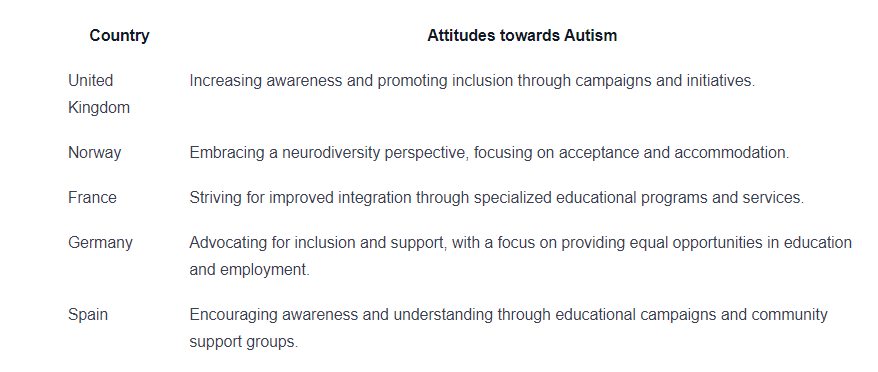
Community Support and Acceptance
Community support and acceptance are vital for individuals with autism in Europe. The level of support and acceptance can vary depending on factors such as geographical location, cultural attitudes, and available resources.
In Europe, there are various organizations, support groups, and initiatives that aim to provide assistance, resources, and a sense of belonging to individuals and families affected by autism. These community-driven efforts play a significant role in promoting acceptance and understanding.
Additionally, community support often extends to educational institutions, workplaces, and public spaces. Efforts are made to create inclusive environments that accommodate the unique needs of individuals with autism. This can include implementing sensory-friendly practices, providing accessible communication methods, and offering appropriate support services.
The table below highlights some examples of community support and acceptance initiatives in Europe:
Community Support and Acceptance Initiatives
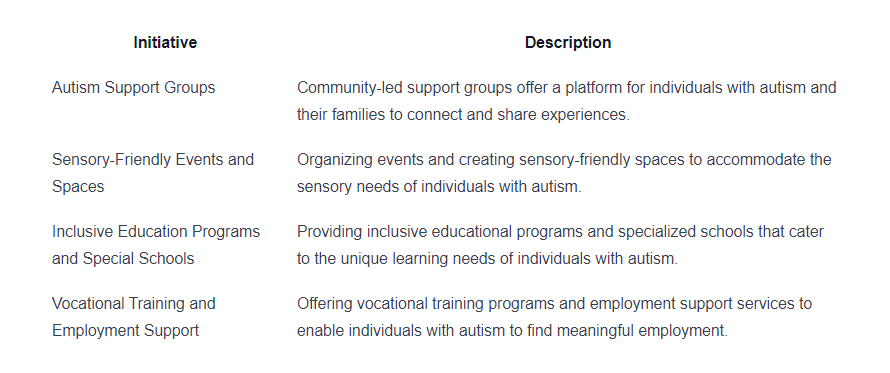
By understanding the cultural perspectives and fostering community support and acceptance, Europe can continue to create a more inclusive and supportive environment for individuals with autism. Efforts in raising awareness, promoting acceptance, and providing appropriate resources are essential in ensuring that individuals with autism can thrive and participate fully in society.
Future Outlook
As our understanding of autism continues to evolve, ongoing research and innovative initiatives in Europe are shaping the future of autism support and intervention. Additionally, advocacy and awareness efforts are playing a crucial role in promoting acceptance and inclusivity for individuals with autism.
Research and Innovations in Autism
Researchers in Europe are dedicated to advancing our knowledge of autism and developing new interventions and therapies. Through interdisciplinary collaborations, they are exploring various aspects of autism, including its causes, underlying mechanisms, and potential treatments.
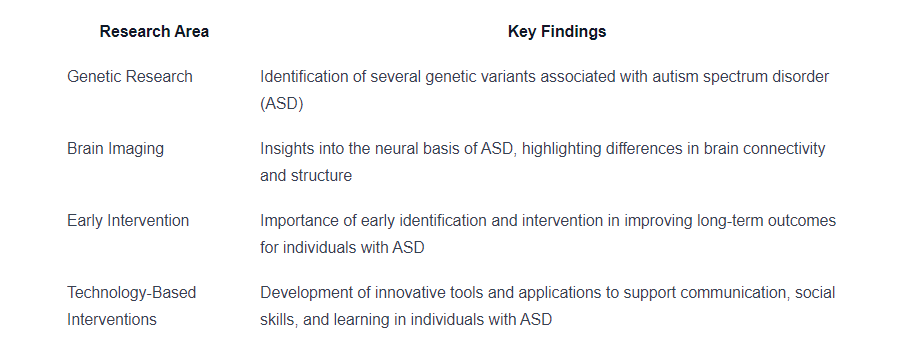
These ongoing research efforts are critical in enhancing our understanding of autism and paving the way for more effective treatments and interventions in the future.
Advocacy and Awareness Efforts
Advocacy organizations and dedicated individuals in Europe are working tirelessly to raise awareness about autism and advocate for the rights and needs of individuals on the spectrum. Their efforts aim to foster a more inclusive society and ensure that individuals with autism are provided with appropriate support and opportunities.
Advocacy and Awareness Efforts
Autism Awareness Campaigns: Promoting understanding and acceptance through public campaigns and events
Parent and Caregiver Support Groups: Providing a network of support and resources for families and caregivers of individuals with autism
Professional Training and Development: Offering training programs for educators, healthcare professionals, and service providers to enhance their understanding and ability to support individuals with autism
Policy Advocacy: Promoting policy changes and legislation to ensure the rights and inclusion of individuals with autism
These advocacy and awareness efforts play a crucial role in dispelling misconceptions, reducing stigma, and creating a more inclusive society for individuals with autism in Europe.
As research progresses and advocacy efforts gain momentum, the future outlook for autism in Europe is promising. Continued advancements in research and innovative interventions, along with increased awareness and acceptance, will contribute to a more inclusive and supportive environment for individuals with autism and their families.
Sources
https://www.crossrivertherapy.com/autism/autism-in-europe-all-the-facts
https://worldpopulationreview.com/country-rankings/autism-rates-by-country
https://www.autismeurope.org/about-autism/prevalence-rate-of-autism/
Similar articles
We’re here to help you

Our team is here to assist you in this process. Contact us for any assistance.
it’s easy to apply
We Accept Most Insurances
Our in-network insurance partnerships make ABA therapy more accessible to families throughout our service areas.







Our Insurance Process
We'll request your insurance details to help us verify your plan's coverage for ABA therapy. Once we've received this information, we'll walk you through your benefits, including copayments, deductibles and out-of-pocket maximums, so you know what to expect in advance.
Our team will then handle the preauthorization and all the necessary paperwork.
.svg)





















.jpeg)


































.jpeg)




.jpeg)







.jpeg)











.jpeg)
















